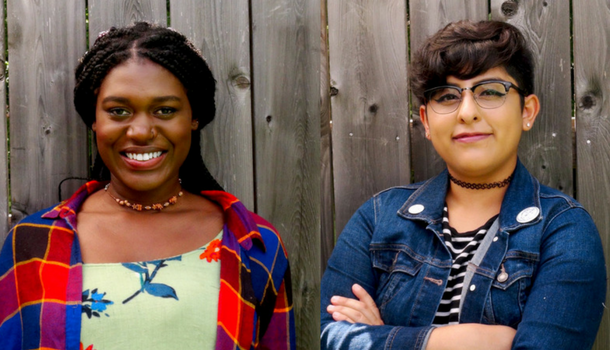
Color Commentary
Houston-based podcast celebrates black and brown LGBTQ communities.

which launches its second season in February.
Alack of media representation makes it difficult for queer people of color to find their place in the LGBTQ community, according to Houston comedian Mai Ha.
“The queer community that people recognize is whitewashed,” says Ha, an Asian-American who identifies as gender non-binary. “As a black or brown person, it can feel like there is no room for you.”
Ha is the producer of Veer Queer, a Houston-based podcast aimed at amplifying the voices of queer people of color. Hosted by Endesha Haynes and Julien Gomez, Veer Queer launches its second season this month.
In addition to the challenges faced by non-white queer people, Haynes and Gomez use their podcast to discuss local and national issues affecting the LGBTQ community.
“I was always struggling with my sexuality growing up,” says Gomez, a bisexual Latinx person who works in marketing for Families Empowered, a Houston nonprofit.
Gomez, who (like Ha and Haynes) didn’t come out until their early 20s, adds that they believe popular TV shows such as The L Word falsely and negatively portrayed the lives of queer folks. “Had there been more mainstream queer media available to me, I think I would have had an easier time navigating it.”
Only a handful of podcasts in the U.S. focus on the experiences of queer people of color. Two of them are based in Austin—Foul Mouthed Musicology and Crown them Royal, which are both run by gay men. Veer Queer is the only LGBTQ podcast in Houston for people of color.
Haynes, an African-American freelance writer, says Veer Queer has given her a space in which to openly express herself.
“We have conversations about topics that people rarely hear about—especially not the in-depth details that we go into,” Haynes says. “We use our personal experiences to show people that it is OK to be who they are. Doing this is very powerful, especially right now.”
In its pilot episode, “Get Out ’n Stay Out,” Veer Queer addressed coming out in the South. Haynes, who identifies as a queer woman, says she had difficulties coming out, in part because of her physical appearance.
“Because of my femininity, people told me I was straight and pursuing women as a phase,” Haynes says. “I struggled trying to unlearn everything that I was taught about relationships, religion, sex, and gender.”
In season 2, Haynes hopes to touch more on queer validity, a theme that stems from the murders of four black lesbians in one week in December.
“The shootings shook me to my core,” Haynes says. “Women of color don’t really get enough recognition as it is. At least one episode will honor those women, so our listeners know how much they mattered.”
Ha says listener response to season 1, which ran biweekly from August to November 2017, was overwhelmingly positive.
“We chose the name because we wanted people to know what the show was about just by reading the title,” Ha says.
Using the word queer was important to Ha, Gomez, and Haynes because it encompasses their sexualities and gender identities. However, Ha says some listeners have been angered by the word because it was once used to slander LGBTQ people.
“Some people still don’t like the word, so they have left us comments telling us not to use it,” Ha says. “We don’t want to push it on anyone, but we are LGBTQ folks who want to reclaim it. The word is coming from a positive place.”
There are seven episodes of Veer Queer online, each running about 45 minutes. Aside from the last episode, the podcast was recorded at the Mocking Bird Network, a recording studio owned by Houston voice-actress Brenda Valdiva. Episode 7 was recorded live at Houston’s Zine Fest, an event dedicated to promoting underground and alternative magazines and mini-comics.
Every episode has been moderated by Ha and features young queer folks of color from Houston. Trans porn actor Valentia Mia spoke to Veer Queer about dating and the stigmas surrounding sex work in episode 2, which is titled “Shiver Me (Why does) Tinder (Suck).” Other topics from season 1 include the queer media, being queer and undocumented, and LGBTQ networking.
Ha says that anti-LGBTQ legislation and Donald Trump’s presidency prompted Veer Queer to focus heavily on events that affect the entire nation, rather than being Houston-specific.
“With [Trump] being in office, we had to find a balance of being fun while also spreading awareness,” Ha says.
Season 2 of Veer Queer will be uploaded biweekly through the spring. The show is available now on iTunes and the Mocking Bird Network.
This article appears in the February 2018 edition of OutSmart Magazine.











Comments